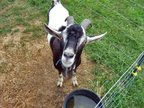Baby goat care is not the hardest thing to do in the world. On the other hand, it is not a walk in the park, either. The difference in hard and easy care would probably be how much you know.
The following are some basic things in caring for baby goats. For the most part, they (the kid and its mother) are gifted with the natural instincts in caring for themselves. Your contribution would be more on the things it (and its mother) cannot do.
Colostrum
If your kid is a newborn, make sure he gets his colostrum within the first 24 hours of his life. Colostrum is the first thick milk produced by the doe containing antibodies the kid needs to have.
The kid’s digestive system changes within 24 hours after birth. He can only absorb the antibodies before that change occurs.
Newborn kids need to be fed regularly, at least four times a day. This is not necessary if the kid is with his mother. However, there are cases when you have to bottle-feed your kid.
In case you do, it is best he gets fresh goat’s milk. If not available, substitute it with raw cow’s milk, adding 3 tablespoons of corn syrup for every gallon. Use a baby bottle with a small “X” cut into the tip. The kid may refuse the bottle at first, but be persistent.
Shelter
Give your baby goat a warm, dry place to sleep, protected from the sun, rain, and draft.
If your baby goat is born in early spring or late winter, there is need for a heat lamp to keep him warm. Straw would make good bedding. It gives good insulation and is easy to clean.
At one week of age, your kid will start nibbling on hay. Start him on good-quality, mold-free grass hay such as Timothy, Orchard or Bermuda.
Weaning
At eight weeks, you can gradually wean him from milk and introduce him to a special blend of goat feed. (Get the instructions on how much to feed him from the directions.)
Trim his hoofs and have him dehorned. If you cannot do these, there are many agricultural programs and 4-H clubs that hosts clinics or give free advice on trimming.)
Disbudding (horn removal) is best done at 2 weeks of age.
Vaccination
At 3 weeks, vaccinate your kid against Enterotoxemia and Tetanus. At 6 weeks, follow this up with a booster shot.
Neuter your male kids if you don’t plan on breeding them. (Too many bucks cause problems in the herd.) There are three ways to neuter goats. These are cutting, banding and using the Burdizzo castration device.
Neutering
Banding is the most common and the easiest for beginners to execute. A band castrator is used to put a small, heavy-duty rubber band around the goat’s scrotum.
The process cuts off blood flow and the testes die and eventually fall off in about two weeks. The males can already be neutered at 4 weeks.
Have your kids go on a de-worming schedule. Before weaning, start them too on coccidiosis drugs before they are weaned.
Love
Goats are herd animals. They cannot stand being alone on their own, most especially baby goats. Goat care includes letting them have other goats live with them.






No comments:
Post a Comment